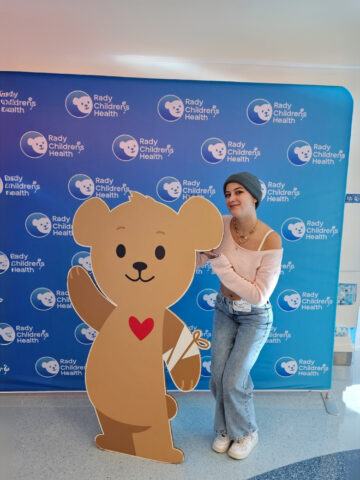Being hospitalized can be scary and stressful, no matter the age of the patient. A visitor can have the same emotions, especially if they are new to a hospital setting. What should I say? Is it ok if I cry? Should I bring them a gift? You will see all sorts of circumstances when you walk into a patient room in the hematology/oncology unit, whether you are visiting your own loved one, or meeting a friend that your loved one has made during treatment at CHOC. The child life specialists of The Cherese Mari Laulhere Child Life Department at CHOC offer the following advice to visitors coming to the hematology/oncology unit.
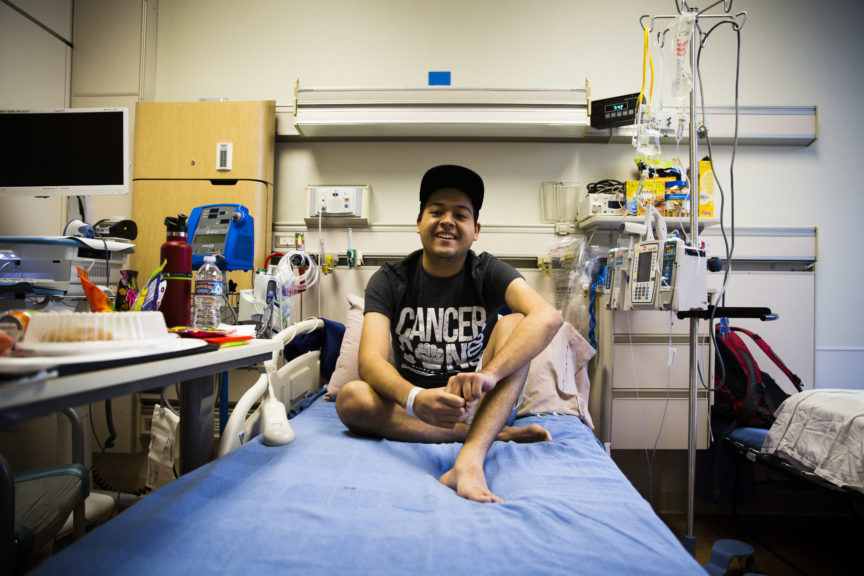
What to say
Ask what shows they are watching, what’s their favorite movie, what they like to do when they’re at CHOC.
If the patient you are visiting is a classmate or friend and you usually see them regularly, it’s ok to tell them that you’ve missed them. Teen patients especially want to hear about what’s going on at school so they feel like they are still part of it. Sometimes it makes them feel sad that they are missing out on things, but ultimately it makes them feel like they haven’t been forgotten.
Ask the family what they need. You may be surprised by what they say, in some cases. Maybe the thing they need most right now is for you to babysit their other children so they can focus on their hospitalized child. Maybe they feel overwhelmed with gifts, but would appreciate if you went to their house and tidied up and did a load of laundry so they have one less thing to worry about.
Send an e-mail or a text message to let them know you are thinking about them. Patients and families often need space immediately following a diagnosis, but they don’t want to feel forgotten about. Offers to help often come mostly in the early days of treatment, and sometimes drop off after a few months. Let them know you haven’t forgotten about them. Families can feel bad saying no to visitors, so give them the option to say, “not right now.” Here are examples:
- “I’m here for you and I’m ready to come at any moment. Please know I don’t want to overstep any boundaries, please tell me no if you do not feel up for a visit.”
- “I’m open to talking about whatever you feel comfortable talking about. I’m here for you and am willing to just listen and be with you in this.”
It’s ok if you don’t know what to say. You may have never been the loved one of someone with cancer before. You can say something like:
- “I don’t know what to say but I’m with you in this.”
- “We’re going to do this together.”
- “I can handle this with you. You shouldn’t have to carry this alone.”
It’s ok to say, “I’m sorry.” It’s ok to cry.
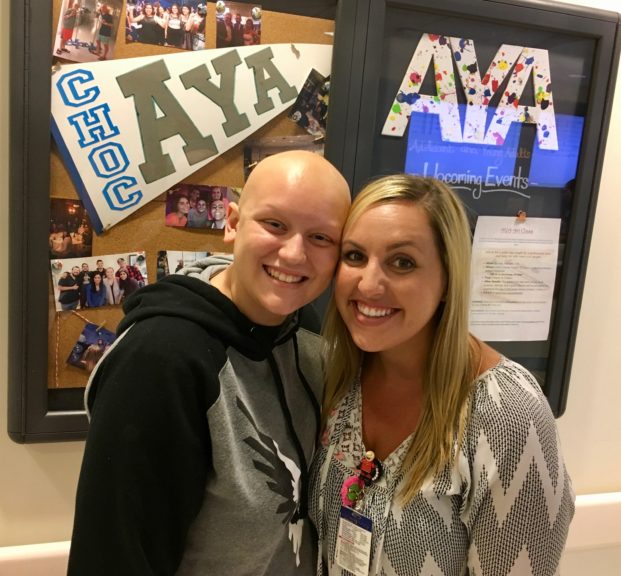
Cancer is often a long and difficult journey. On some days, your friend may feel positive and strong, and on other days they may feel overwhelmed. On these days, tell them, “It’s ok to not be ok.” Give them permission to feel whatever they are feeling. Validate their feelings by saying, for example, “You have every right to be sad and angry. This isn’t fair, but we’ll get through this together.”
What not to say
Never assume age or gender, just because of a patient’s size or lack of hair. CHOC treats a variety of ages here, from babies all the way up to young adults.
Don’t ask how long they’ve been here or when they get to go home. They might not know the answer, which can be frustrating.
Avoid asking how school is going. This may only remind them they are missing out on time with friends, and isolated in the hospital.
Although some patients enjoy ordering food delivered straight to their rooms, avoid asking questions about food because some patients have restrictive diets. Others might be nauseous from chemotherapy treatment, and some may not be able to eat regular food that day if they are about to have a procedure.
Visitors can be great motivation for patients to get out of bed. However, don’t assume they can get up and walk around. Instead of asking, “Hey, do you want to go walk to the playroom or catch Turtle Talk?” you can say, “We can take a wheelchair, or if you feel like getting up we can try that,” and let the patient be the one to tell you that they can walk.
You care a lot about the person you are visiting in the hospital, so it’s natural to want to ask how they are doing when you walk into their room. Instead, say “Hey, it’s so good to see you!” to avoid sparking any feelings of sadness if they aren’t feeling their best that day.
Look to the patient for conversation cues. Don’t ask a lot of questions about their treatment plan unless they offer up that information. Patients spend a lot of time every day talking to their care team about their treatment plan and how they are feeling, so they may not want to talk about it again with you. It is, however, ok to ask them if they want to talk about how they’re feeling or their treatment plan, and give them the freedom to say no.
Never use the phrase “at least.” You may be trying to bring positivity to a sad and scary situation, but do not say “I know cancer is bad, but at least it’s not (insert any other condition or treatment setback here).”
Do not compare your own experience with cancer to theirs. Every cancer journey is unique, and patients aren’t receptive to hearing “I understand.”
Avoid using blanket statements such as “You’re my hero” or “You’re so strong.” Instead, tell them why they are strong, and what characteristics you see in them.
What to bring
Bring an activity that you can do with your friend or loved one. Art projects, puzzles, crossword of the day, and board games are all great options.
Supplies to decorate their room is always a welcome surprise. This can also include cozy pajamas, slippers, twin sheets and cozy blankets.
Before bringing food, check with the patient’s parents or legal guardians. Some smells may bother them or they might not be eating typical food that day due to an upcoming procedure. They might not want food then but may want snacks to keep in their rooms.
All rooms have DVD players and Xbox consoles. Patients can checkout movies and video games from the Family Resource Center or the child life department, but bringing them a fresh stash of entertainment can be a thoughtful gesture. Mini speakers are another way that you can help patients relax by listening to their favorite music.
The CHOC gift shop, located on the second floor of the Bill Holmes Tower, offers a variety of games, books, arts and crafts, stuffed animals, toys, mylar balloons and more. Loved ones can call 714-509-8668 to place an order over the phone and arrange for it to be delivered straight to a patient’s room.
Don’t forget about the parents! Although care teams and social services at CHOC stress the importance of self-care for parents, having a hospitalized child often means that moms and dads forget about their own needs. Parents also appreciate things for their room to help them feel comfortable: cozy pillows and blankets, books and magazines, nice shampoo and conditioner all go a long way. Some families like aromatherapy as well.
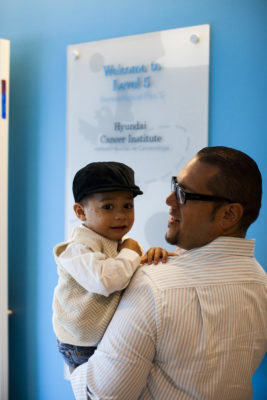
Sometimes, our patients and families are just not up for visitors, but they would still appreciate your thoughtfulness. Be ok with dropping something off in the first-floor lobby and not feeling entitled to a visit. This shows that you are respectful of their space while they’re healing. Gift cards for gas, groceries, and local restaurants around the hospital are always appreciated. If you’re not local (and check with the family first), you can also order meal from a nearby restaurant to be delivered that they can pick it up in the first-floor lobby. CHOC’s Area Resource Guide provides information on nearby restaurants.
What not to bring
Flowers are a beautiful and thoughtful gesture, but due to the bacteria that grows in soil, oncology patients are not permitted to receive flowers.
Get more expert health advice delivered to your inbox monthly by subscribing to the KidsHealth newsletter here.
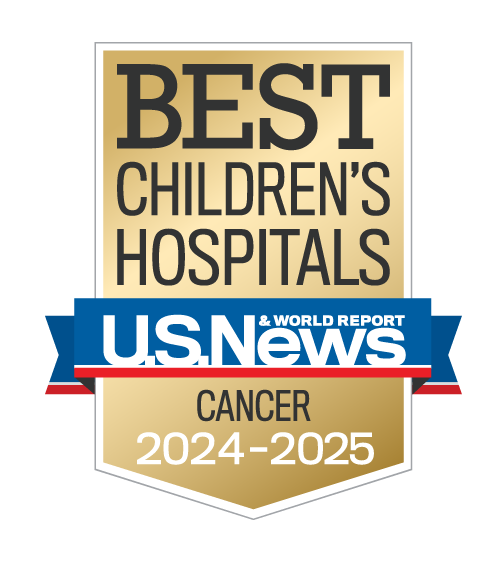
Learn more about the Hyundai Cancer Center at CHOC
CHOC Hospital was named one of the nation’s best children’s hospitals by U.S. News & World Report in its 2024-25 Best Children’s Hospitals rankings and ranked in the cancer specialty.


